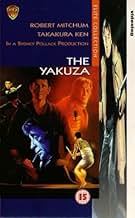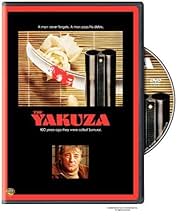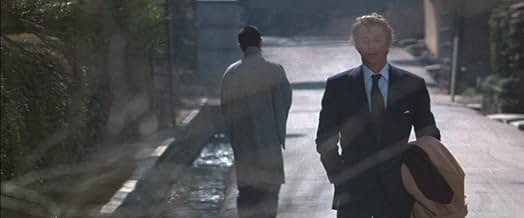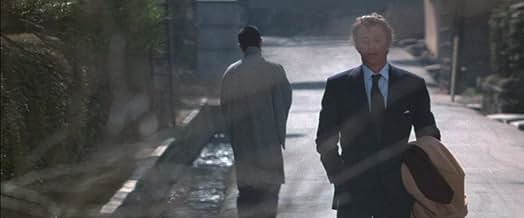CALIFICACIÓN DE IMDb
7.2/10
11 k
TU CALIFICACIÓN
El detective privado estadounidense Harry Kilmer regresa a Japón para rescatar a la hija secuestrada de un amigo de las garras de la Yakuza.El detective privado estadounidense Harry Kilmer regresa a Japón para rescatar a la hija secuestrada de un amigo de las garras de la Yakuza.El detective privado estadounidense Harry Kilmer regresa a Japón para rescatar a la hija secuestrada de un amigo de las garras de la Yakuza.
- Dirección
- Guionistas
- Elenco
Ken Takakura
- Ken Tanaka
- (as Takakura Ken)
Eiji Okada
- Toshiro Tono
- (as Okada Eiji)
Keiko Kishi
- Eiko Tanaka
- (as Kishi Keiko)
Kyôsuke Machida
- Jiro Kato
- (as Kyosuke Machida)
Eiji Gô
- Shiro 'Spider' Tanaka
- (as Go Eiji)
- Dirección
- Guionistas
- Todo el elenco y el equipo
- Producción, taquilla y más en IMDbPro
Opiniones destacadas
The strongest point of this film is the writing. It's the first Paul Schrader script ever to be filmed, written with his brother Leonard (who also worked with Paul on Blue Collar & Mishima) and Robert Towne (Chinatown, Marathon Man, Bonnie & Clyde). It seems we have the best of both Schrader's here; Leonard really understands the Japanese culture and Paul is a very cerebral and thematic writer who almost always raises a number of interesting issues.
The film, which is very respectful of it's foreign culture and tries to be as true as possible to it, first and foremost shows the differences between American and Japanese culture. However, there are so many themes in this movie though that it becomes tiresome to list them. The key ones include honor, loyalty, burden, duty, friendship, love, loss, obligation, and the differences between the men of pre and post war Japan.
Although Robert Mitchum was approaching 60 when made the film, he still possessed enough of his trademark grace to be credible enough against much younger men in the action scenes. He always exudes so much casualness and weariness, but his work here shows he was obviously fired up by the material.
The other standout actor is Ken Takakura. He plays an honorable man that everyone respects, but his honor and old ways also often make him intolerable to anyone around him. He hides the deep wounds of his character behind his stone face, but that doesn't in any way prevent him from conveys that he's a miserable man from another age who lives by his code but not for anything. As he's the native that used to be in the Yakuza and Mitchum is the gaijin that doesn't have to follow their honor system (although as the movie progresses, he subscribes to their codes and honor system more and more), Takakura gets to do all the skilled swordplay. His fighting won't thrill those who want a lot of stunts, but is great if you enjoy the psychology and strategy of the craft.
The film is it has a drab, low budget kind of look, mainly as a way to maintain the mood and tone of the piece. Some of the scenes really bring the material to life, particularly through some excellent camera work, but sometimes the look is indifferent and the soundtrack seems to be trying too hard. Aside from staying true to the material and getting strong performances, I wouldn't say that Sydney Pollack has done a great job here. This is not the kind of movie you watch if you are looking for John Woo action though, and for the most part the flaws are overshadowed by the strength of the script and performances. 8/10
The film, which is very respectful of it's foreign culture and tries to be as true as possible to it, first and foremost shows the differences between American and Japanese culture. However, there are so many themes in this movie though that it becomes tiresome to list them. The key ones include honor, loyalty, burden, duty, friendship, love, loss, obligation, and the differences between the men of pre and post war Japan.
Although Robert Mitchum was approaching 60 when made the film, he still possessed enough of his trademark grace to be credible enough against much younger men in the action scenes. He always exudes so much casualness and weariness, but his work here shows he was obviously fired up by the material.
The other standout actor is Ken Takakura. He plays an honorable man that everyone respects, but his honor and old ways also often make him intolerable to anyone around him. He hides the deep wounds of his character behind his stone face, but that doesn't in any way prevent him from conveys that he's a miserable man from another age who lives by his code but not for anything. As he's the native that used to be in the Yakuza and Mitchum is the gaijin that doesn't have to follow their honor system (although as the movie progresses, he subscribes to their codes and honor system more and more), Takakura gets to do all the skilled swordplay. His fighting won't thrill those who want a lot of stunts, but is great if you enjoy the psychology and strategy of the craft.
The film is it has a drab, low budget kind of look, mainly as a way to maintain the mood and tone of the piece. Some of the scenes really bring the material to life, particularly through some excellent camera work, but sometimes the look is indifferent and the soundtrack seems to be trying too hard. Aside from staying true to the material and getting strong performances, I wouldn't say that Sydney Pollack has done a great job here. This is not the kind of movie you watch if you are looking for John Woo action though, and for the most part the flaws are overshadowed by the strength of the script and performances. 8/10
The Yakuza introduced we occidentals to the term the Japanese use for their various crime families. Probably after the wide acceptance of both the Godfather films, the American public was ready to see what organized crime looked like in another culture.
La Cosa Nostra, the Mafia, all those phrases we use for Italian organized crime certainly had their rituals and traditions. But as we learn in watching this film they have nothing on the Yakuza.
Robert Mitchum plays a private detective who works both sides of the law back in the states and he's hired by crime boss Brian Keith to rescue his daughter who was kidnapped by one of the Yakuza crime families in lieu of a shipment of weapons Keith was supposed to deliver. Coming along with him is young Richard Jordan whose father was a friend of both Mitchum and Keith as backup.
The mission is accomplished, but Mitchum and Jordan find the situation is a whole lot more complex than they were led to believe. In addition Mitchum gets involved with an old girl friend from the days when he was a military policeman during the postwar American occupation. She's the key to getting help from a former Yakuza member in their quest.
The American actors perform well here and oriental players James Shigeta and Japanese film star Takakura Ken are well cast as feuding Yakuza brothers. You will not question why Takakura Ken is known as the Japanese Clint Eastwood after seeing The Yakuza.
Director Sydney Pollack shows a real reverence and respect for the traditions of another culture. The Yakuza is both entertaining and informative and should not be missed.
La Cosa Nostra, the Mafia, all those phrases we use for Italian organized crime certainly had their rituals and traditions. But as we learn in watching this film they have nothing on the Yakuza.
Robert Mitchum plays a private detective who works both sides of the law back in the states and he's hired by crime boss Brian Keith to rescue his daughter who was kidnapped by one of the Yakuza crime families in lieu of a shipment of weapons Keith was supposed to deliver. Coming along with him is young Richard Jordan whose father was a friend of both Mitchum and Keith as backup.
The mission is accomplished, but Mitchum and Jordan find the situation is a whole lot more complex than they were led to believe. In addition Mitchum gets involved with an old girl friend from the days when he was a military policeman during the postwar American occupation. She's the key to getting help from a former Yakuza member in their quest.
The American actors perform well here and oriental players James Shigeta and Japanese film star Takakura Ken are well cast as feuding Yakuza brothers. You will not question why Takakura Ken is known as the Japanese Clint Eastwood after seeing The Yakuza.
Director Sydney Pollack shows a real reverence and respect for the traditions of another culture. The Yakuza is both entertaining and informative and should not be missed.
Not only is this a good 70's gangster/action flick, it is also one of the few movies about Japan ever produced in the States that does not make too many mistakes about Japanese culture.
Ken Takakura puts in a great performance which is no surprise since he first became famous in Japan for acting in yakuza (gangster) movies.
Anyone who has ever tried to understand or explain the concept of "giri" should see this movie!
Ken Takakura puts in a great performance which is no surprise since he first became famous in Japan for acting in yakuza (gangster) movies.
Anyone who has ever tried to understand or explain the concept of "giri" should see this movie!
A neglected classic of 70s film-making, this is perhaps the most "Japanese" movie ever made by a non-Japanese. The story is rich and multi-layered, featuring not one but two sets of star-crossed lovers in a brilliant and melancholy examination of contrasting themes of memory, secrets and betrayal, friendship, honor and obligation. The script is both literate and intricate; the characters' motives are almost always obscure until another layer of deception is stripped away.
Only Robert Mitchum could have done justice to the role of Harry Kilmer, a retired detective returning to Japan for the first time in many years to rescue his old Army friend Tanner's daughter, who has been kidnapped by the Yakuza in a dispute over a debt Tanner owes them. When Kilmer arrives in Japan, he seeks out Ken, the brother of his ex-lover Eiko (played by the astoundingly lovely and talented Kishi Keiko). Ken is a lone wolf, an ex-Yakuza who now runs a martial arts school, and though there is obviously no love lost between the two, Kilmer knows Ken carries an obligation to him for rescuing Eiko and her infant daughter in the early days of the Occupation.
Kilmer is still bitter about the past, deeply wounded by his love for Eiko, who would not marry him even though she loves him deeply. This was the reason why he left Japan and never meant to return.
Now, with Ken's reluctant help, he rescues Tanner's daughter, but this only leads to an intensifying spiral of tragic consequences, because nothing is quite what it seems. Only when Kilmer begins to understand the truth of the situation is he able to act constructively.
Everyone in this film, from Brian Keith to Herb Edelman to Richard Jordan (in one of his first starring roles) turns in a first-rate performance. James Shigeta and Christina Kobuko also deserve honorable mention. But it is Mitchum and Takakura Ken who make this movie.
This is not an action film in the sense of later -- and far inferior -- efforts like "The Challenge" and "Black Rain", though there are scenes of intense and graphic violence. Nor does it have a happy ending, although some of the characters do ultimately find redemption and a hope of reconciliation.
"The Yakuza" is a work that deserves a much larger audience, one which will totally engage a thoughtful viewer with its universal themes worked out against the background of a very different culture, with its own mindset and traditions. I give it my highest recommendation.
Only Robert Mitchum could have done justice to the role of Harry Kilmer, a retired detective returning to Japan for the first time in many years to rescue his old Army friend Tanner's daughter, who has been kidnapped by the Yakuza in a dispute over a debt Tanner owes them. When Kilmer arrives in Japan, he seeks out Ken, the brother of his ex-lover Eiko (played by the astoundingly lovely and talented Kishi Keiko). Ken is a lone wolf, an ex-Yakuza who now runs a martial arts school, and though there is obviously no love lost between the two, Kilmer knows Ken carries an obligation to him for rescuing Eiko and her infant daughter in the early days of the Occupation.
Kilmer is still bitter about the past, deeply wounded by his love for Eiko, who would not marry him even though she loves him deeply. This was the reason why he left Japan and never meant to return.
Now, with Ken's reluctant help, he rescues Tanner's daughter, but this only leads to an intensifying spiral of tragic consequences, because nothing is quite what it seems. Only when Kilmer begins to understand the truth of the situation is he able to act constructively.
Everyone in this film, from Brian Keith to Herb Edelman to Richard Jordan (in one of his first starring roles) turns in a first-rate performance. James Shigeta and Christina Kobuko also deserve honorable mention. But it is Mitchum and Takakura Ken who make this movie.
This is not an action film in the sense of later -- and far inferior -- efforts like "The Challenge" and "Black Rain", though there are scenes of intense and graphic violence. Nor does it have a happy ending, although some of the characters do ultimately find redemption and a hope of reconciliation.
"The Yakuza" is a work that deserves a much larger audience, one which will totally engage a thoughtful viewer with its universal themes worked out against the background of a very different culture, with its own mindset and traditions. I give it my highest recommendation.
Superb East-meets-West movie, I suspect largely due to Schrader's insight. Takakura Ken's performance really steals the show, though all actors are more than capable; Mitchum gives a great performance again. Not a martial arts movie, but contains a katana showdown that I can watch over and over again without finding fault [more believable than anything you'll see in 'Kill Bill'].
The story is gorgeously convoluted, keeping it's secrets to the very end, in a fitting Japanese manner. Action scenes are relatively restrained, and the story tells how Mitchum's character finally comes to understand Takakura Ken's character, and his apparently icy antagonism. When can we see a DVD copy?!
The story is gorgeously convoluted, keeping it's secrets to the very end, in a fitting Japanese manner. Action scenes are relatively restrained, and the story tells how Mitchum's character finally comes to understand Takakura Ken's character, and his apparently icy antagonism. When can we see a DVD copy?!
¿Sabías que…?
- TriviaMartin Scorsese wanted to direct after Calles peligrosas (1973), but the producers wanted Sydney Pollack. Scorsese is on record that he would very much have liked to direct the film and was disappointed that he was passed over. However, he got to direct Alicia ya no vive aquí (1974) instead after being sought out by Ellen Burstyn. "Alice" ended up making more than 20 times its budget and won Burstyn an academy award, while this film became a box office bomb.
- ErroresThe plane that Kilmer is boarding at the end is a Boeing 707; the one shown taking off in the last scene is a 727.
- Versiones alternativasFor the Spanish Castilian version all the dialogues were dubbed to Spanish, even the Japanese lines.
- ConexionesFeatured in ...Promises to Keep (1974)
Selecciones populares
Inicia sesión para calificar y agrega a la lista de videos para obtener recomendaciones personalizadas
- How long is The Yakuza?Con tecnología de Alexa
Detalles
Taquilla
- Presupuesto
- USD 5,000,000 (estimado)
- Tiempo de ejecución
- 1h 52min(112 min)
- Mezcla de sonido
- Relación de aspecto
- 2.39 : 1
Contribuir a esta página
Sugiere una edición o agrega el contenido que falta


















